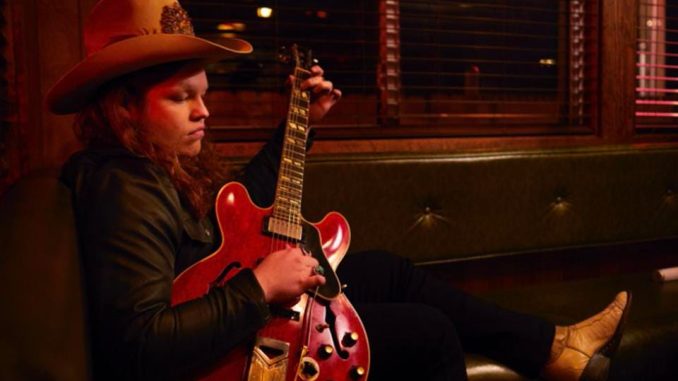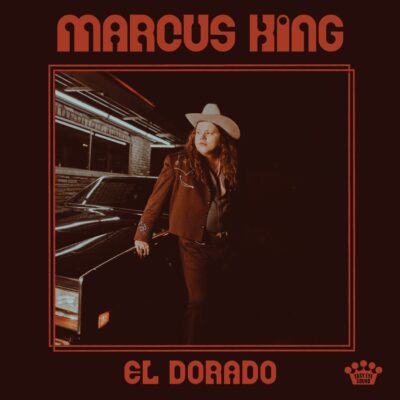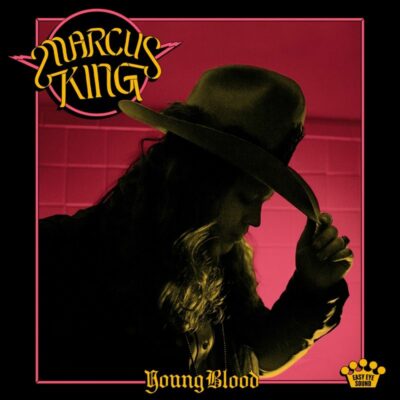
Dr. Martin Luther King, Jr. was once quoted as saying, “Music is the best consolation for a despaired man.” For Marcus King, that was certainly the case, particularly when grappling with personal issues while trying to navigate the pandemic at the same time. You don’t have to look any further than King’s latest solo outing Young Blood, which hit the streets at the end of August 2022. For the 26-year-old vocalist/guitarist, getting to reunite with friend/producer Dan Auerbach for this sophomore bow was a lifeline despite the fact that he was still navigating some dark times when the duo went into the studio for a quick six-day recording binge in May 2021.
(Photo by Danny Clinch)
“I had a really big breakup that happened shortly before we started writing and I had already prodded this concept of a record that was to be this big rock and roll trio-sounding [project],” King said. “The subject matter just kind of serendipitous because I happened to go through this really rough chapter of my life right before we started writing. It was a big crescendo of a four-year relationship that was really toxic. It was an unhealthy relationship and that was from my doing and from her doing. I take my responsibility and my blame in the bad parts of that relationship. But at the end of the day, it was two people that were not meant to be together.”
 Unlike King’s 2020 solo debut El Dorado, which was also produced by The Black Keys founding member and was more of a rhythm and blues effort, the 11 cuts that make up Young Blood found the South Carolina native and Auerbach scheming to create a project that tapped into a classic power trio sound with a nod to storied groups like the Jimi Hendrix Experience, Grand Funk Railroad, Black Sabbath, Free and ZZ Top, For King, it’s a testament to the synergy he’s created with his newfound friend.
Unlike King’s 2020 solo debut El Dorado, which was also produced by The Black Keys founding member and was more of a rhythm and blues effort, the 11 cuts that make up Young Blood found the South Carolina native and Auerbach scheming to create a project that tapped into a classic power trio sound with a nod to storied groups like the Jimi Hendrix Experience, Grand Funk Railroad, Black Sabbath, Free and ZZ Top, For King, it’s a testament to the synergy he’s created with his newfound friend.
“Dan really curated the band because he knew what we were going for, the direction we wanted to go and during the writing process, it even more so took shape as it does,” King explained. “He knew exactly the cats that we needed. We had a full New York rhythm section. Chris St. Hilaire on drums and Nick Movshon on bass. And then we got Andrew Gabbard from Ohio, who is also in The Black Keys. We had him writing and playing rhythm guitar on the record. Really, Dan’s whole approach to this stylistically was to turn the microphones on and let us go. The chemistry was there immediately amongst the musicians and the songs were there. We just needed to put it all together. What you’re hearing on the record is a lot of live takes, aggression and anguish. I was trying to get it out in any way that I could. And that’s the best way that I know how.”
 Auerbach is equally effusive about his love and respect for King saying, “Music runs so deep in Marcus’s blood he might not even realize how born to do this he is. He probably does, but God, he’s the real deal. Marcus has Southern Soul as part of his foundation. If you’re going to play rock ‘n’ roll with Marcus, you have to understand that element. It’s just who he is. This record didn’t take a lot of pushing. We put the right people in the room and let them do their thing. These songs are live performances. The whole damn thing is live—the solos and everything. It’s so rare in this day and age.”
Auerbach is equally effusive about his love and respect for King saying, “Music runs so deep in Marcus’s blood he might not even realize how born to do this he is. He probably does, but God, he’s the real deal. Marcus has Southern Soul as part of his foundation. If you’re going to play rock ‘n’ roll with Marcus, you have to understand that element. It’s just who he is. This record didn’t take a lot of pushing. We put the right people in the room and let them do their thing. These songs are live performances. The whole damn thing is live—the solos and everything. It’s so rare in this day and age.”
Songs like the Gov’t Mule-meets-Lynyrd Skynyrd-flavored “Lie Lie Lie” with it’s lines like, “I let her in then she took me for a joy ride/I let her win and I still don’t even know why/I was singing she was smoking on a pipe dream/She was living but it wasn’t in reality” and the soulful closer “Blues Worse Than I’ve Ever Had,” where King sings, “Drinkin don’t help, drugs won’t make a dent/Money might change it, but I ain’t got a cent/Just like a cannonball, feel I’m headed for a fall” hold a mirror up to the personal struggles the young phenom has been grappling with over the years, particularly in the past few years. If anything, he admits the existential pause button that was COVID-19 forced him to face the trauma he’d been carrying with him through his young life.
“I think spending about a year together trapped in a house with someone—it kind of expedited what would have inevitably happened,” he said. “I would have probably ended up in a loveless marriage or something like that for however many years. It just kind of made us both realize that wasn’t working. That being said, the abandonment fears that I had were deeply rooted and just kind of took control and led me into a really dark period of substance abuse and suicidal thoughts. It was a really dark period and I’m just really glad that I had music, as cliché as it sounds. It was during and after the recording of the album that I was really struggling. I actually met my fiancé not long after we started touring again. It was a real turn-around moment for me.”
With a healthy amount of therapy and the support of Briley Hussey, the new woman in his life, King is in a good place. The symbiotic power of playing before live audiences has also proved to a restorative tonic, At a recent New York City show, the young guitarist was leading a nine-piece that included a horn section and two percussionists that powered through a set of originals and covers that included Marvin Gaye’s “Trouble Man” as his opening number and included takes on Leon Russell’s “Delta Lady” and a pair of Allman Brothers gems—”Southbound” and “In Memory of Elizabeth Reed.” In keeping with his penchant for unexpected covers, King took on Crowded House’s “Don’t Dream It’s Over,’ in which Hussey was introduced and sang most of the song. It all represents the positive and forward-looking part of his life in which King credits music with being a major factor in seeing him through his sorrow, something he tries to share whenever he plugs in.
“We like to have a full release on stage—emotionally, spiritually and physically and that’s the best part of my day,” he said. “I try my best to stay active and create healthy habits on the road. But the best part of my day is on that stage when I’m able to say all of those things. In one way, it’s difficult because I’m reliving a lot of really bad moments. But with that reciprocation of love that I’m putting out and validation [from the crowd]—it’s a therapeutic moment for me to be heard and for people to know that I hear them and go through the same things they do. It’s this mutual thing that’s like a conversation. I think that’s what people like about our live show. We don’t leave anything on the table. We all come off the stage completely exhausted.”

